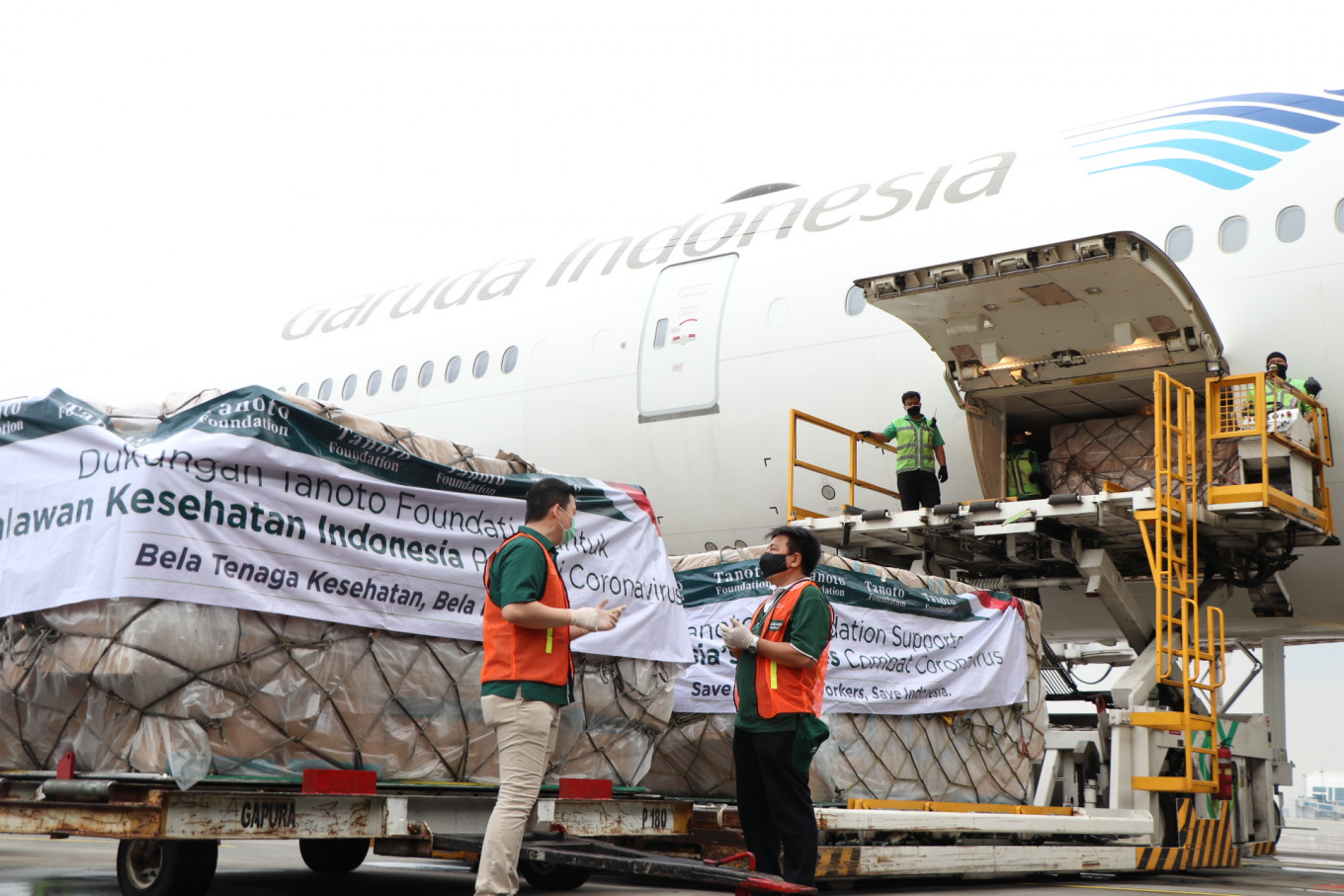Popular Reads
Top Results
Can't find what you're looking for?
View all search resultsPopular Reads
Top Results
Can't find what you're looking for?
View all search resultsAirport operators pivot to cargo services to survive pandemic
Change text size
Gift Premium Articles
to Anyone
S
tate-owned airport operators Angkasa Pura I and II are turning to cargo and warehousing services to shift their revenue source as the government’s social restrictions continue to affect air passenger numbers.
Operating in an archipelagic nation, where air transportation is essential to connect far-flung islands, Angkasa Pura (AP) II sees potential for growth in the air cargo industry in Indonesia, despite having recorded a decline in cargo volume at its airports during the pandemic.
Air freight volume at its 19 airports fell 34 percent year-on-year (yoy) to 79,556 tons between April 1 and June 7, data from AP II cargo subsidiary Angkasa Pura Kargo (APK) show. However, the operator managed to record 34,000 tons of cargo traffic between May 7 and June 7 alone.
“The cargo volume is not as high as in normal conditions. But the shipment volume, which still stands at 34,000 tons, shows that business prospects in air shipment remain stable and have the potential to grow this year,” AP II president director Muhammad Awaluddin said in a press statement on Sunday.
Awaluddin also noted the absence of restrictions for air cargo amid the pandemic, as well as the decision by commercial airlines to modify their fleets with freighters to support the airport cargo business.
To further capitalize its air cargo business, AP II through APK established a partnership with cargo agents while also employing cost-efficiency measures at its storage facilities.
“We are consolidating cargo loads from several sub-agents and bundling them together so they can be shipped using a chartered carrier. We already established charter cargo flights twice a week in June, and we aim to double it to four flights per week,” APK operational director Riyanto Cahyono told The Jakarta Post via text message on Monday.
The company also reduced its operational costs at storage facilities across the AP II airports by 40 percent compared to normal operations, Riyanto added.
In addition, AP II provided warehouse facilities for airlines via its subsidiaries PT Angkasa Pura Kargo and PT Gapura Angkasa. For example, Gapura Angkasa, which owns a warehouse more than 8,900 square meters in size at Soekarno-Hatta International Airport in Tangerang, Banten, provides access to facilities like cold storage and animal storage.
Tapping into these aspects of the cargo business line, as opposed to relying on air passenger traffic, has allowed the airport operator to begin softening the impact COVID-19 has had on the industry.
According to Statistics Indonesia (BPS), domestic air passengers fell 85.18 percent yoy in April to around 840,000 people, while international air passengers fell 98.26 percent yoy.
The drop in passenger traffic has hit airport revenues hard, as data from the 2019 Airports Economics Report, released by Airports Council International (ACI), shows that 54.6 percent of total airport income in the Asia-Pacific comes from passenger-related revenues.
AP I cited revenue diversification through the establishment of an airport ecosystem that includes a cargo village as part of its survival strategy during the pandemic. It aims to create a new business stream that depends little on aircraft and passenger traffic, it stated.
“Angkasa Pura I has prepared a rebound strategy to anticipate the new normal and to prepare for a jump in the company’s growth in 2021 through a multidimensional performance improvement program,” AP I president director Faik Fahmi said on Saturday in a press release, adding that the current situation was “challenging for airport operators”.
AP I logistics subsidiary Angkasa Pura Logistics (APL) launched its own air freight service on June 4.
It aims to provide logistics services that can reach areas that are difficult for commercial planes to access due to short runways. For its operation, APL would focus on the delivery of marine and perishable goods, which require quick shipping times to ensure freshness.
Transportation expert Djoko Setijowarno told the Post that the companies made the right decision by focusing their business on the cargo sector.
“It’s a step that must be taken during the pandemic as passenger numbers are slumping. Logistics could serve as a source of income for the airports and there is also huge potential for domestic cargo in Indonesia,” Djoko said in a phone interview on Monday.










